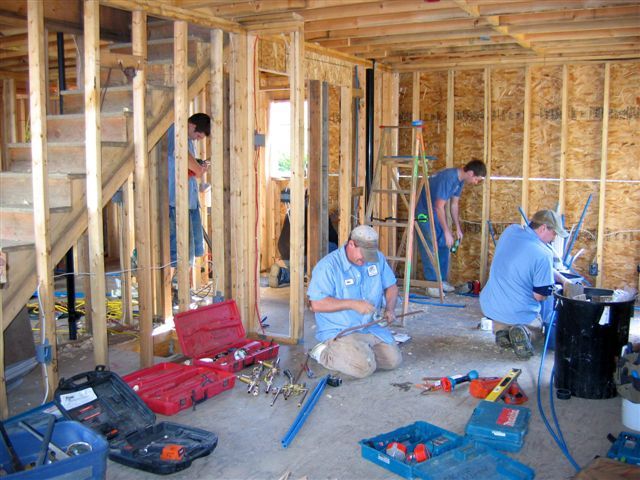
Non-profit found horrifying housing conditions when checking 31 applications for affordable homes in Wilson Creek this year; four applicants chosen
By Margot Grant Housing non-profit Habitat for Humanity says its plan to build three duplexes at the former RCMP site at 749 School Road in Gibsons depends on what the community wants.
Executive director Cori-Lynn Germiquet says Habitat is open to other forms of housing at the site and she will discuss options with Gibsons Director of Planning Andre Boel on November 23.
Habitat could build a condo tower with 12 to 20 units if that’s what the community and the neighbourhood want, says Germiquet. “We could also look at prefab homes at the site, but we would rather build well than fast.”
She says it is important not to impose anything on the neighbourhood: “We want to have a good relationship with the neighbourhood.”
The federal government is willing to sell the site for $1 as part of the Surplus Federal Real Property for Homelessness Initiative. At a committee-of-the-whole meeting on November 7, Germiquet proposed that Habitat build six duplexes on the site, with the first family moving in within two-and-a-half years.
Councillors Silas White and Stafford Lumley did not fully support the proposal at the November 7 council meeting. “What are the options for transitional housing on that site, what are we doing for the homeless?” Lumley asked. “I would certainly hope we can accommodate more people.”
Habitat builds affordable houses for working families who can afford a no-interest mortgage. Its mandate is not to build rental housing, but to help with affordable home-ownership. “There are lots of fabulous organizations on the Coast able to build rentals if that is what the community wants,” Germiquet says.
Habitat builds two homes a year on the Coast, but would like to double that number. Last July, the organization found 31 families interested in obtaining a house through Habitat. Officials met with 10 families, and four were chosen this week for a house in Wilson Creek.
Habitat checked the living conditions of the applicants, and found horrifying situations. A family with several children lived in a wet house with the roof caving in and mushrooms on the inside walls. Water gushed down the hill into the house and onto a closet floor, but the family did not complain to the landlord for fear of losing the rental.
A mother with two children lived in an 18-foot trailer without running water, heat or electricity. To use the bathroom, they had to walk to a nearby house. A family with children with special needs lived in a structure that could not be kept clean; pests and bugs lived in the walls. A single dad had to share his bedroom with four children between the ages of two and seven.
“It is totally wrong that in a rich country like Canada, people would have to live like this,” Germiquet says. Statistics Canada found that in 2015, seventy households in Gibsons were living in accommodation that was “not suitable,” and 115 needed major repairs.
All these parents had regular jobs, a criteria to qualify for a Habitat home. Applicants need to be able to pay for an interest-free, 28-year Habitat mortgage for $250,000 that would cost them no more than 30 per cent of their income, including property tax. If the owners’ income drops for any reason, they do not lose their home; Habitat simply gives them more time to pay off the mortgage.
Applicants need to put in 500 hours of work on their new home; family and friends can lend a hand during 150 of those hours. A covenant on title ensures that Habitat always has the first right of refusal if the home is sold; Habitat returns their mortgage payments, and Germiquet emphasizes that the Habitat branch on the Sunshine Coast insists that all homes are bought back in such circumstances.
In 2019, after Habitat has built 14 homes on the Coast, it will need to buy more bare land or land with homes to renovate. Because this may no longer be affordable, the nine Habitat for Humanity organizations in B.C. have formed an alliance to talk to the provincial government about access to Crown land, relaxing of regulations, new policies, and funds from BC Housing and ministries such as social services, education, environment, health, and economic development.
“The economy cannot grow if people have nowhere to live,” Germiquet says.